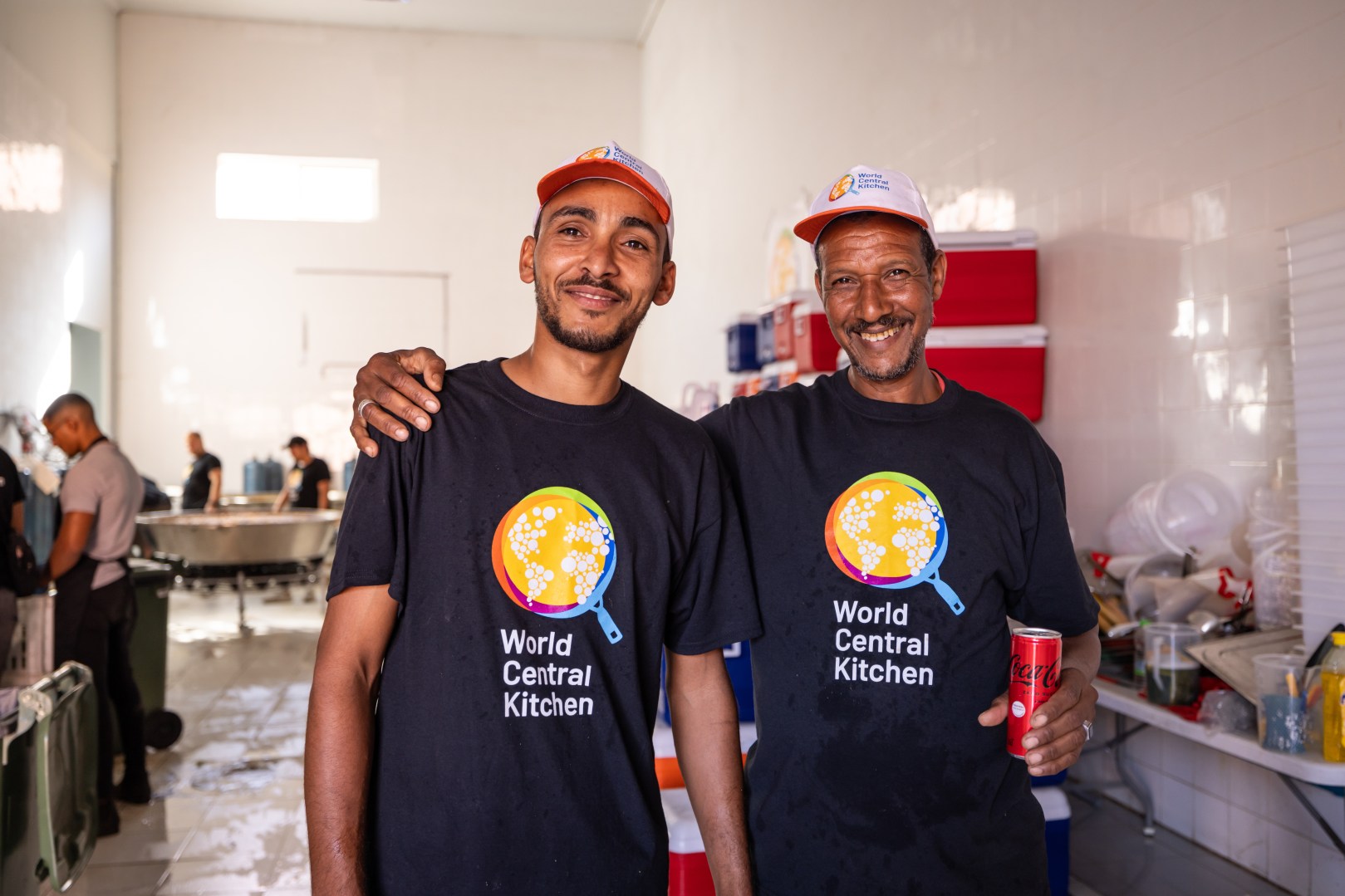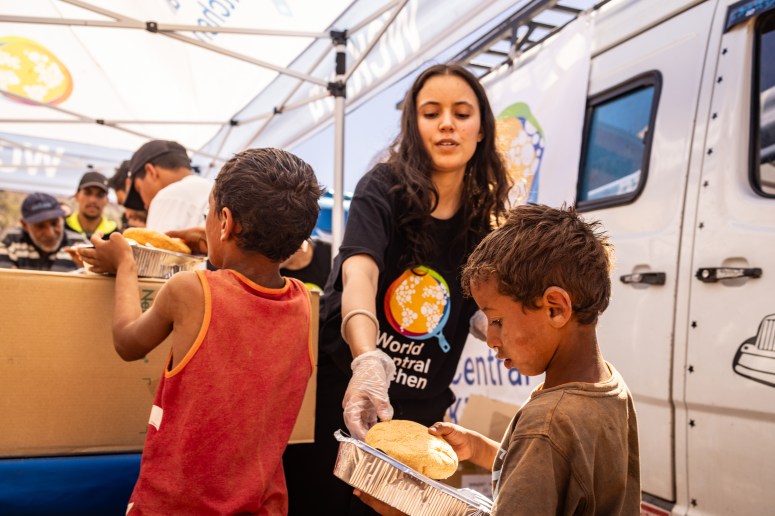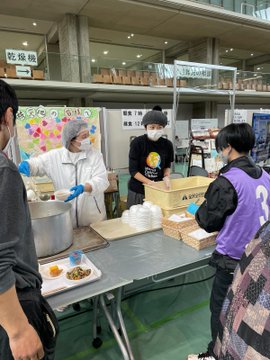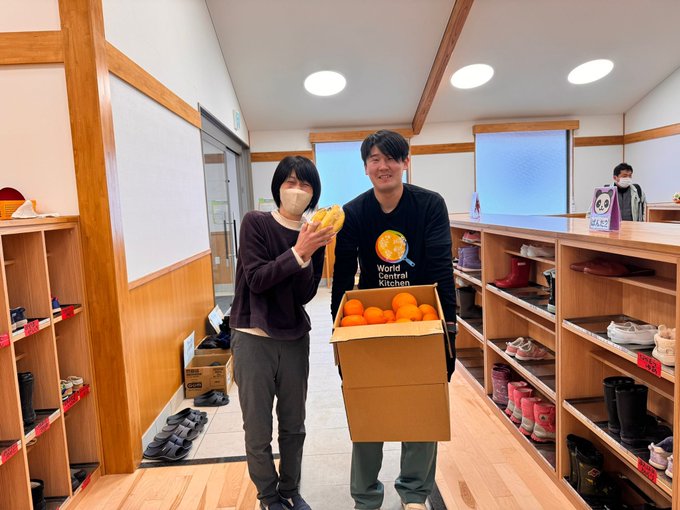Moroccans feeding Morocco

Since the early September earthquake struck Morocco, World Central Kitchen has served more than 700,000 meals by cooking from two Field Kitchens and working alongside dozens of restaurant, catering, and NGO partners. Our teams are working closely with locals and adapting to every challenge, making sure we get food to anyone in need.
“Every hour, every day changes,” said Zomi, WCK’s response lead in Morocco. “Because we are deeply embedded in the community and led by Moroccan people, we know that and can respond accordingly.”
Our teams first arrived in Morocco within hours of the earthquake and quickly identified many villages across the Atlas Mountains in urgent need of support. Three weeks in, many hard-hit communities still lack consistent access to food. “There’s a lot of aid that’s coming by the Moroccan government, by some international and local organizations,” explained Erin Gore, WCK’s CEO who was on the ground in Morocco. “But World Central Kitchen is really focused on those most remote villages that are truly right at the epicenter.”
This part of Morocco is marked by skinny dirt roads dotted with rock slides that wind through the mountains. Now, there are tens of thousands of people living in tents beside those roads because their houses are either destroyed or not structurally safe to live in.
Our response has scaled quickly as we work alongside local partners to prepare enough meals to meet the need we are seeing in remote villages. During the early stages of our efforts, we relied on helicopters and 4×4 vehicles to reach communities isolated due to impassable roads—you can read more about these early efforts here. Since then, we have also used pack mules, dirtbikes, trucks of all shapes and sizes, and—when all else fails—walking, to make sure that we reach people and deliver the food they need.
Food safety in the mountains
“If you think about a hot meal and food safety,” explains Ali from WCK’s Data Team, “you have X amount of time—three, four hours max—to get a meal from the kitchen to whoever is ever eating that meal. And then you look at this landscape and you see these amazing, gorgeous, giant mountains. They’re beautiful, but that also poses challenges.”
The Data Team and Ali’s mapping capabilities have been invaluable to WCK’s response in Morocco. They are helping our distribution teams plan routes that get food to communities in the shortest amount of time—taking into account the current state of roads, where rockslides and other newly-formed obstacles can cause problems.

Within a week of the earthquake, WCK had built and started cooking out of a Field Kitchen in the city of Asni, located in the foothills of the Atlas Mountains. The problem was that our community outreach teams were finding need not only in the Al Haouz Province, where Asni is located, but also in the Taroudant Province to the south. Traveling this distance takes four, sometimes six hours along the winding roads of the Atlas Mountains—far too long for hot meals to travel. To solve this problem, WCK began building a second Field Kitchen.
Meeting the people of Oulad Berhil
Our teams just started cooking from a second Field Kitchen in the city of Oulad Berhil, 80 miles southwest of Asni, where the meals made can reach communities in the Taroudant Province quicker. As with every response, the local community is helping guide our work, and awing our teams with their grace, kindness, and grit. “Today is my first day, but I think it’s not going to be the last,” said Mohamed, an Oulad Berhil local who came to volunteer with WCK. “I enjoy it here, the people here are very welcoming,” he said on his first day working with us. Because of his fluent English—a language that many younger Moroccans speak—Mohamed is helping our teams as a translator.

“I’m very proud to be a person from Oulad Berhil,” Mohamed told us. After the earthquake, “helping people in the mountains was our first idea. The second idea is welcoming this organization.” He spoke candidly about the terror he experienced during the quake, how one moment you are dealing with the worries and thoughts of daily life, and the next, “You forget everything. This is the most shocking thing about the earthquakes. They make you rethink about what you are doing in this life.”
He also echoed a sentiment our teams hear time and time again from people in the communities we support: “We are one people in this country and we are Moroccans. All of us, we come today to help.”
Relief Kitchens and delicious meals
In both our Asni and Oulad Berhil Relief Kitchens, our culinary teams are working with local Moroccans to procure food items and create meals that are nourishing, comforting, and culturally appropriate. WCK chefs are visiting markets, buying spices, and using proteins and vegetables commonly featured in Moroccan cuisine. A staple menu item has been tagine—similar to stew, it is a popular dish across North Africa. WCK-provided meals are served with bread and a piece of fresh organic fruit from local farms.
By tradition, Friday is couscous day in Morocco, where people across the country sit down to share the meal with their families. We learned this from our local team members and used this knowledge to shape our menu. Since the first burner was lit in our Asni kitchen, we have had incredible chef volunteers working with us from the Moroccan Chefs Association. They made couscous not just for the communities we are supporting, but also for our staff and volunteers to sit down and eat together.
“In our community or in our culture, food is one main part of sharing care,” explained Asmaâ, one of our Moroccan volunteers. “It’s very important for us to make you feel like you are wanted. You are wanted by these people.”
Sharing tea in the mountains
Asmaâ’s words that “food is one main part of sharing care” fully embody WCK values, and it is something that we are experiencing firsthand in Morocco. Our delivery teams spend each day driving for hours through the mountains, visiting the same villages day after day, and forming relationships with the people there. The majority of people in this part of Morocco—the Amazigh people of the Atlas Mountains—are still living in tents. Yet, they are inviting our teams to sit with them for a moment, share tea, and regain energy to continue the delivery route.
“There really is a very warming hospitality in the villages,” said Asmaâ of her experience in the region. Though they are the ones who have lost loved ones, their homes, and many of their possessions, they continue to share whatever they have. While delivering food to a village, a man invited our team to sit and share tea with him, and showed them the tent where he and his wife are living. He told our team that, though his house was destroyed, what really mattered was that he and his wife are alive.
Getting feedback to plan the future
While we continue to deliver thousands of hot meals in the mountainous region, we are also gathering feedback from villages on what aid they need. “We’ve heard from the more remote mountainous douars—which are small villages—that there’s a very strong desire for meal kits: potatoes, carrots, green beans,” said Erin. “The families are able to take care of and cook for themselves, but they have no access to food right now.”
Knowing this, our teams have begun planning for and assembling food kits of fresh produce and dry goods that we can distribute to places where people can cook for themselves. We are also now procuring large cooking equipment like couscoussier—a double-chamber pot used in North African cooking—along with tea pots and gas burners. Our teams will be providing this equipment to villages that need it so they can begin cooking for themselves once more, using ingredients from the food kits we are distributing. “Winter is coming and families are anxious to prepare,” Zomi emphasized. “We want to make sure we build resilience in their communities for cooking long after we’re gone. Especially for villages above the snow lines.”
“Food is love. Food is energy. Food is to live,” said Asmaâ, who understands the importance of WCK’s work and—more than that—what food means in Moroccan culture. Beginning as a volunteer, she has since become an invaluable member of our community outreach team. She and all of the locals who are helping us are essential to WCK’s work. Erin, our CEO, put it succinctly: “The local volunteers and local contractors and local chefs are truly invaluable…this work is made possible because of Moroccans feeding Morocco.”
Learn more about our efforts here. For real-time updates, follow WCK on Twitter, Instagram, and Facebook.
Help us keeping cooking for Moroccan families in need.




















